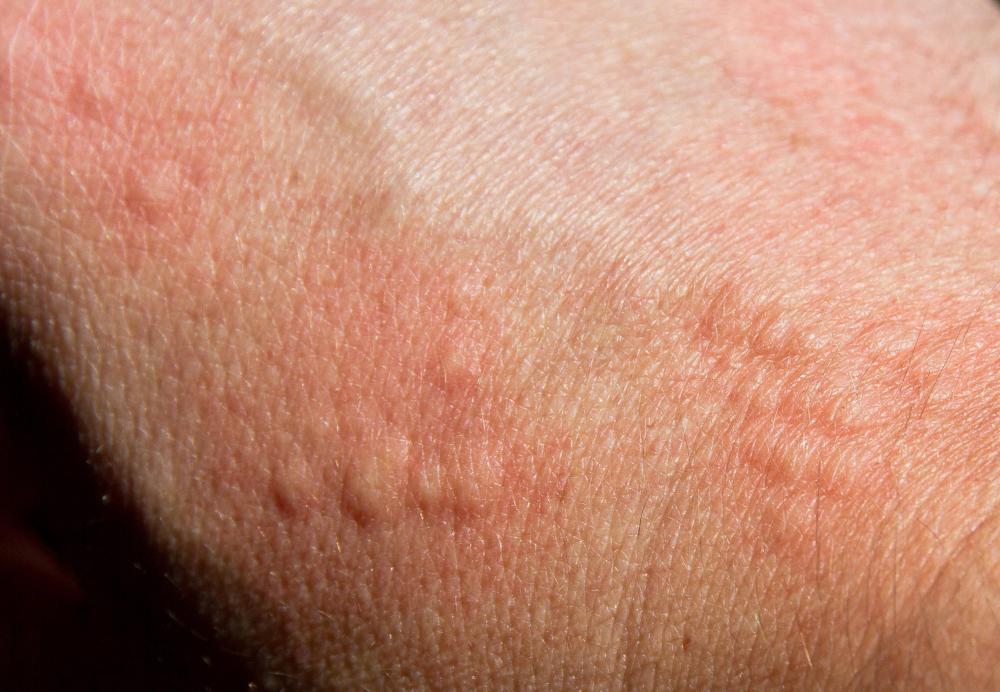At WiseGEEK, we're committed to delivering accurate, trustworthy information. Our expert-authored content is rigorously fact-checked and sourced from credible authorities. Discover how we uphold the highest standards in providing you with reliable knowledge.
What Are the Different Allergic Reactions to Antibiotics?
Although antibiotics are designed to help treat infections by killing bacteria, some people may have allergic reactions to them that prevent them from taking the medication. Allergic reactions to antibiotics can be mild or very severe and life threatening. Some people may experience a rash or hives, while others may go into anaphylatic shock.
Allergies antibiotics may happen immediately after the person takes the medicine or within a day. In some cases, the reaction is late onset and takes up to three days to occur. People who were exposed to antibiotics in utero may be more likely to suffer an allergic reaction, as are people who are otherwise exposed to antibiotics when they didn't need to be. Young adults are at a greater risk for allergic reactions to antibiotics than older people or children.

A rash or hives are common allergic reactions to antibiotics. The rash can be a group of red or white bumps that show up on any part of the body or a flat rash that looks like red lace. Hives look like welts and appear and disappear all over the body. The hives are usually red but can be white and are often itchy.
If a person does get a rash after taking an antibiotic, it doesn't always mean he is suffering an allergic reaction. In some cases, the rash can be part of the illness or can simply be a side effect of the medicine. If it is caused by an allergy, taking an antihistamine should help it fade. Until the rash clears up, a person should stop taking the antibiotic.

Some allergic reactions to antibiotics are life threatening and require immediate attention from a doctor. Although some people may have mild wheezing after taking an antibiotic, others will experience a swelling in the throat that restricts breathing. Another sign of a severe reaction, or anaphylaxis, is a drop in blood pressure.
Several tests can be done to confirm whether someone is actually suffering from an allergic reaction or if he is just experiencing a side effect of the medicine. A skin test will determine whether a person's body reacts to certain antibodies. A radioallergosorbent test, or RAST test, mixes a sample of blood with the allergen to see if the body produces the IgE antibody. Distinguishing between a side effect to an antibiotic and an actual allergic reaction is essential for proper treatment. Side effects will usually clear up with use, while allergic reactions can be deadly.
AS FEATURED ON:
AS FEATURED ON:

















Discussion Comments
I have a nephew who has had a life threatening reaction to a certain antibiotic. I don't remember which one it was, but he started having trouble breathing and was rushed to the hospital.
As a parent, this would be very hard to deal with. With so many types of antibiotics out there how would you know which ones would be safe to take or not?
Now he has to be under very close supervision whenever he is prescribed an antibiotic for something. We are hoping this is something he will grow out of as he gets older, but he will probably always have to be more cautious than other people when it comes to taking certain medications.
I have four kids and there has been no shortage of antibiotics in our family. It seems like if one of them comes down with something, they all end up getting it.
My daughter broke out in a rash after taking one of the antibiotics she was given. This happened about 2-3 days after she started taking it. She had taken this before without any problems, but the doctor told her to quit taking it and her prescribed something else for her.
There are several people in my family who have an allergic reaction to the amoxicillin antibiotic. This is one that is commonly used for many different infections, but I am afraid to use it.
Whenever I am in a situation where I need to take an antibiotic I always ask them to prescribe something other than this. Every time I go to a doctor and they ask me if I am allergic to any medications I tell them I don't know if I am allergic to it or not, but let them know what my family history has been.
Thankfully there are a lot of other antibiotics to choose from that work well without any problems for me. The only bad side effect I have had from taking an antibiotic is a yeast infection.
I have a friend who is allergic to penicillin. This means there are a lot of antibiotics that she can't take. There are a lot of different antibiotics out there, but she has only found one that she doesn't have a reaction to.
I think this would be very frustrating. The last time she had an ear infection was when she finally found an antibiotic that she could tolerate. I sure hope she doesn't build up a resistance to it like a lot of people do when they are on antibiotics.
Post your comments